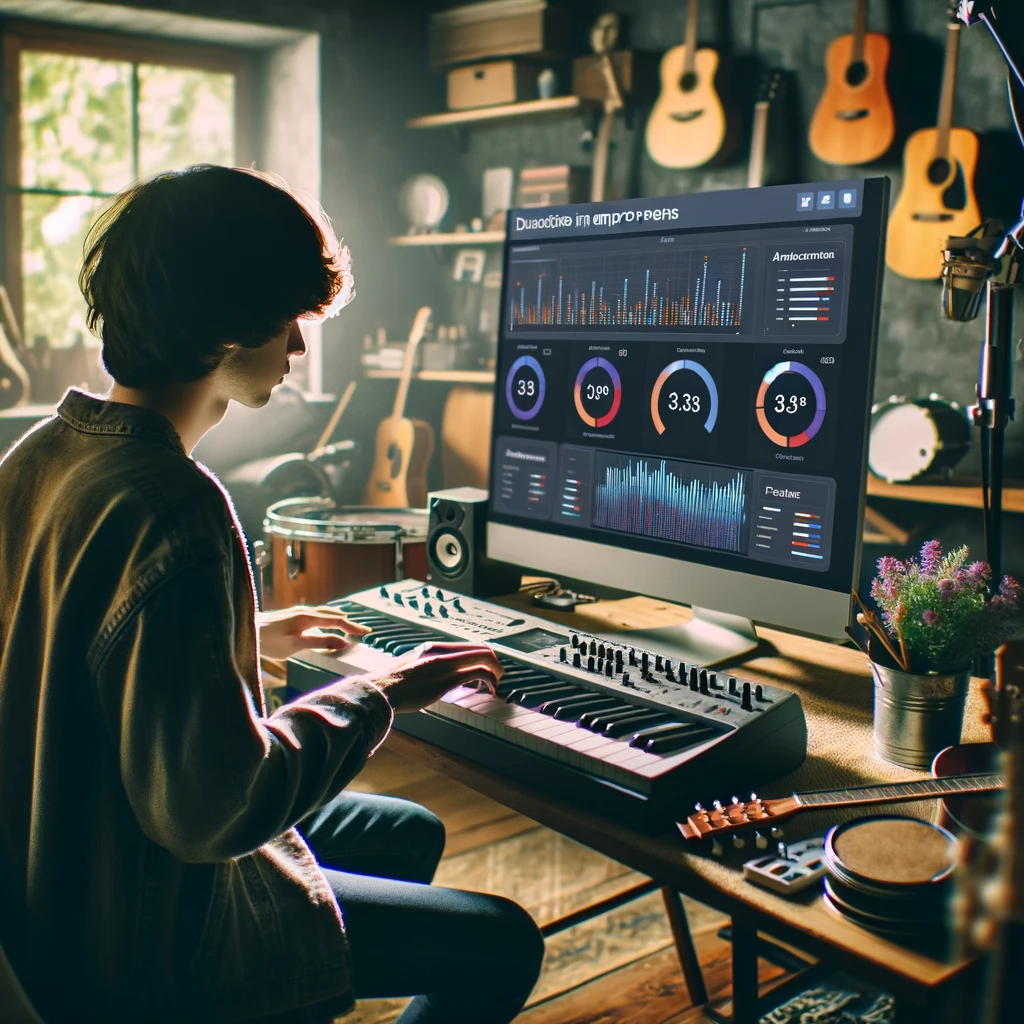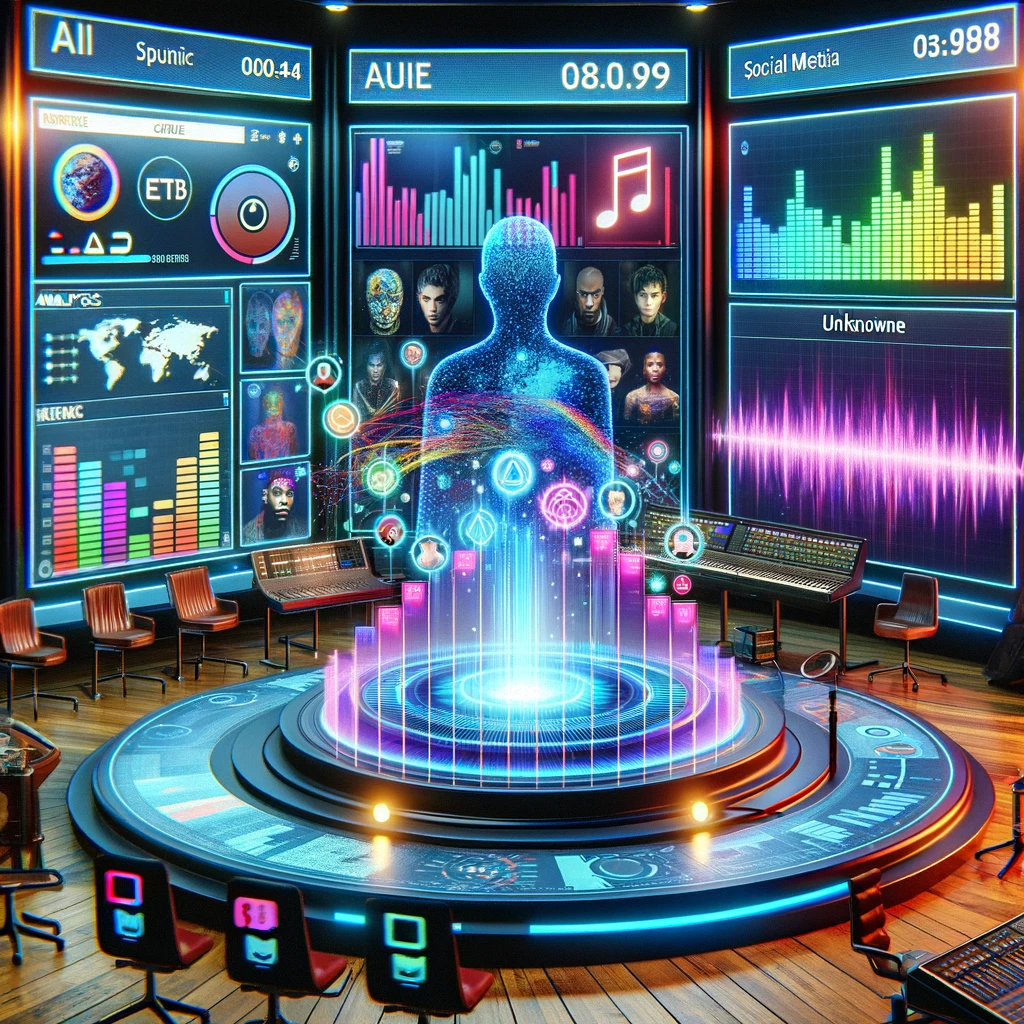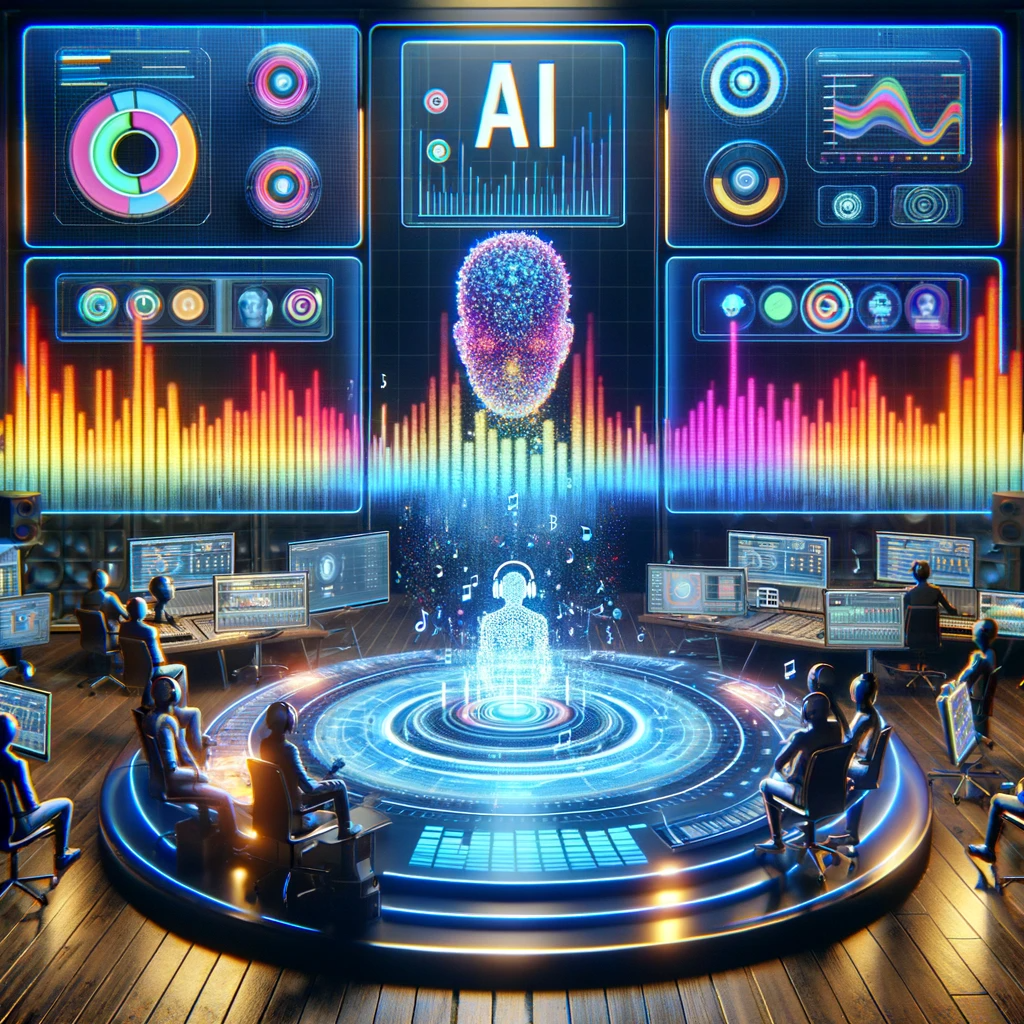In the vast and ever-evolving world of music, the pursuit of discovering new and emerging artists has been a lifelong journey for music enthusiasts. The thrill of stumbling upon a hidden gem, the excitement of witnessing a rising star’s breakthrough moment, and the joy of sharing these discoveries with friends have been integral to the music experience. However, in the digital age, where the sheer volume of music available can be overwhelming, the quest for musical exploration has taken a new form.
Artificial Intelligence (AI), with its ability to analyze vast datasets and identify patterns, has emerged as a powerful force in the music industry, reshaping the way we discover and celebrate new music artists. From personalized playlists and tailored recommendations to talent identification and promotion, AI has begun to play a pivotal role in the musical landscape.
This article embarks on a journey to explore the transformative impact of AI on music discovery, focusing on its role in identifying and promoting emerging talent. In a world where millions of songs are at our fingertips, AI offers a curated pathway to uncover the sounds and voices that resonate with us the most.
Our exploration begins with an examination of the traditional methods of music discovery, from word-of-mouth recommendations to the role of music journalists and radio. We’ll delve into the limitations and challenges faced by these traditional approaches, highlighting the need for innovation in the quest for new musical experiences.
As we move forward, we’ll explore how AI made its grand entrance into the music industry, revolutionizing the way we consume and interact with music. AI-driven platforms and streaming services have introduced us to the magic of personalized playlists and intelligent recommendations, creating a more tailored music experience.
The heart of our journey lies in understanding how AI identifies emerging talent in the vast sea of music content. We’ll unravel the mechanics of AI algorithms that analyze audio features, lyrics, and listener behavior to recognize the potential of new artists. Real-world examples of AI-powered platforms will illustrate the tangible impact AI has on discovering and supporting musicians on their journey to stardom.
As we venture further, we’ll explore the profound implications of AI-driven music discovery on musicians and record labels. From indie artists gaining recognition based on their merit to established acts embracing AI as a promotional tool, the landscape of the music industry is shifting.
However, no transformation comes without its challenges and controversies. We’ll address concerns related to algorithmic bias, ethical considerations, and the impact of AI on artistic diversity. The music industry is grappling with the need for transparency and responsible AI implementation.
In conclusion, we’ll gaze into the future of music discovery, where AI continues to evolve and shape our relationship with music. We’ll speculate on AI’s potential to uncover niche genres, experimental sounds, and voices that have remained unheard. The journey to discover new music artists has taken a technologically driven turn, but the essence of exploration, excitement, and connection with music remains at its core. In this AI-infused musical landscape, the beat goes on, and the melody of discovery continues to resonate.

The Art of Music Discovery
In the not-so-distant past, music discovery was an art form in itself. It involved word-of-mouth recommendations from friends, the keen ears of radio DJs, and the pages of music magazines. Whether it was a mixtape from a fellow music enthusiast or a cherished vinyl record discovered in a dusty thrift store, the thrill of uncovering new and exciting music was a deeply personal and often serendipitous experience.
Music journalists played a vital role in curating musical journeys, introducing readers to obscure bands and genres through insightful reviews and articles. Radio stations served as sonic gatekeepers, exposing audiences to an eclectic mix of tunes that spanned generations and styles. Friendships were forged through the exchange of CDs and vinyl records, with the promise of musical enlightenment waiting to be unveiled.
However, as the digital era dawned, the landscape of music discovery underwent a profound transformation. The sheer volume of music available at our fingertips grew exponentially. Streaming platforms offered access to millions of songs, each a potential discovery waiting to happen. In this era of abundance, the traditional methods of music discovery faced new challenges.
AI’s Arrival in the Music Industry
Amidst this shift, Artificial Intelligence (AI) made its grand entrance into the music industry, wielding the power of data analysis and machine learning. AI algorithms began to understand our musical preferences, learning from our listening habits, and serving up personalized playlists that seemed to read our musical minds. The music landscape was now curated not by DJs or journalists but by algorithms that dissected our tastes, creating playlists that felt tailor-made for each listener.
Streaming services adopted AI-driven recommendation engines, ensuring that the next song played was not just random but a calculated choice based on what we had previously enjoyed. The era of serendipity in music discovery gave way to a more structured and data-driven approach, where AI played matchmaker between listeners and songs.
In this new musical paradigm, AI extended its influence beyond playlists. It ventured into the realm of talent identification and artist promotion. It became an agent of change in the way we discover and celebrate emerging music artists.
How AI Identifies Emerging Talent
The mechanics of AI’s talent identification are a marvel in themselves. These algorithms ingest vast amounts of music data, not just in the form of audio tracks but also lyrics, social media chatter, and listener behavior. They dissect audio features, dissecting melodies, rhythms, and harmonies to understand the musical DNA of each track.
But AI doesn’t stop at audio analysis. It delves into the world of lyrics, deciphering the emotional resonance and storytelling prowess of songs. It scans social media platforms to gauge the buzz around an artist or track, identifying rising stars in real-time. AI even studies how listeners engage with music, considering factors like skipping patterns, repeat listens, and user-generated playlists.
This multi-faceted analysis allows AI to recognize patterns and trends, unveiling the potential of emerging talent. It can identify the signature sounds, lyrical themes, and audience engagement levels that signify an artist’s ascent. AI doesn’t rely on gut feelings or subjective judgments; it relies on data-driven insights to predict which artists are on the brink of stardom.
The Impact on Musicians and Labels
The impact of AI-driven music discovery extends beyond the listener’s experience; it touches the lives of musicians and the strategies of record labels. For independent artists, AI offers a glimmer of hope in a competitive industry. It levels the playing field, allowing talent to shine based on the merit of their music rather than the size of their marketing budget.
Artists who might have remained hidden gems can now be discovered by a global audience through AI-powered platforms. These platforms not only identify talent but also support artists by promoting their music to the right audience. Musicians no longer have to rely solely on traditional gatekeepers to reach their fans; they can harness the power of AI to connect directly with their audience.
Established acts are also embracing AI as a promotional tool. It helps them understand their fan base better, allowing them to tailor their music and marketing strategies accordingly. Record labels are using AI to scout talent more efficiently and to analyze market trends, helping them make informed decisions about artist signings and marketing campaigns.
In this evolving landscape, AI has become an indispensable ally for musicians and record labels alike. It’s reshaping the industry by democratizing access to opportunities and by placing the focus back on the music itself. As we continue our journey into the realm of AI in music discovery, we’ll explore the challenges and controversies that this transformation brings, the ethical considerations surrounding algorithmic curation, and the need for a balanced approach to innovation in the music industry.
Challenges and Controversies
While AI-driven music discovery holds immense promise, it is not without its challenges and controversies. As algorithms shape our musical journeys, concerns and debates have arisen about the impact of AI on the art of music discovery.
One of the primary challenges is the potential for algorithmic bias. AI systems learn from historical data, and if this data is biased or reflects existing inequalities in the music industry, the recommendations generated by AI can perpetuate these biases. This raises concerns about the diversity of artists and genres that receive visibility and recognition through AI-driven platforms.
Ethical considerations also come into play when AI is entrusted with curating our musical experiences. Questions arise about the role of human curation and editorial judgment in the age of algorithms. Should AI solely dictate what we listen to, or should there be a balance between data-driven recommendations and human expertise?
Additionally, the ease of access to vast music libraries through AI can sometimes result in overconsumption and a lack of deep engagement with music. The pleasure of serendipity and the joy of savoring an entire album can be lost when music is reduced to a series of algorithmically generated tracks.
As we navigate these challenges, it becomes evident that responsible AI implementation in music discovery is essential. Transparency in how algorithms operate, ongoing efforts to minimize bias, and the incorporation of human curatorial expertise are all crucial aspects of ensuring that AI enhances, rather than detracts from, the richness of music discovery.

The Future of Music Discovery
In this era of AI-powered music discovery, we stand at a crossroads, gazing into the future with both anticipation and caution. AI is set to continue its evolution, shaping our relationship with music in ways we are only beginning to fathom.
One of the most exciting possibilities is AI’s potential to uncover niche and experimental genres that may have remained hidden otherwise. As algorithms become more sophisticated, they can delve deeper into the vast archives of music, unearthing sounds and voices that resonate with unique tastes.
Moreover, AI has the power to support diversity in the music industry. By analyzing listener behavior and identifying trends, it can promote artists and genres that have been historically underrepresented. This could lead to a more inclusive and equitable music landscape, where a wider array of voices is celebrated.
AI’s role may extend beyond just discovery; it may become a partner in creativity. As AI-generated music and collaborative AI tools gain ground, artists may find new ways to push the boundaries of their craft. Musicians could use AI to explore novel sounds, experiment with compositions, and even co-create with virtual AI counterparts.
In the ever-evolving landscape of music discovery, one thing remains constant: the human connection to music. While AI can curate playlists and recommend tracks, the emotional resonance and personal meaning that music holds in our lives are irreplaceable. Music remains a deeply personal and emotional experience, and AI, for all its data-driven prowess, is a tool in our hands, amplifying the joy of discovery.
As we step into this AI-infused musical future, we have the opportunity to strike a balance between the technological marvels of AI and the enduring magic of music. It is a future where algorithms and emotions harmonize, where AI augments our musical journeys, and where the beat of discovery continues to resonate in our hearts and souls.
Conclusion
The intersection of Artificial Intelligence (AI) and music discovery has ushered in a new era in the world of music. As we reflect on the transformative journey we’ve undertaken in this article, it becomes abundantly clear that AI is changing the way we discover new music artists, and the impact of this change reverberates across the music industry and our personal musical experiences.
In the not-so-distant past, the art of music discovery was a blend of serendipity, personal recommendations, and the keen insights of music journalists and radio hosts. It was a journey that often relied on chance encounters and the thrill of finding hidden gems. However, the digital age brought with it an overwhelming abundance of music, making the traditional methods of discovery seem less feasible.
The arrival of AI in the music industry marked a profound shift. AI algorithms harnessed the power of data analysis and machine learning to understand our musical tastes and preferences. They curated personalized playlists and recommendations, introducing us to music that resonated with our unique sensibilities. The days of randomly stumbling upon new artists gave way to a more structured and data-driven approach to music discovery.
AI’s ability to identify emerging talent is nothing short of remarkable. By analyzing audio features, lyrics, listener behavior, and social media engagement, AI can recognize patterns and trends that signify the potential of new artists. It doesn’t rely on gut feelings or subjective opinions; instead, it offers data-driven insights into which artists are on the verge of stardom.
This transformation has far-reaching implications for musicians and record labels. Independent artists can now be discovered by a global audience through AI-powered platforms, leveling the playing field in a competitive industry. Established acts are using AI to better understand their fan base and tailor their music and marketing strategies accordingly. Record labels are scouting talent more efficiently and making informed decisions about artist signings.
However, as AI takes center stage in music discovery, it also brings challenges and controversies. Algorithmic bias, ethical considerations, and concerns about overconsumption have become part of the conversation. Responsible AI implementation and transparency are essential to ensuring that AI enhances the richness of music discovery rather than detracting from it.
Looking to the future, AI holds the promise of unearthing niche genres, celebrating underrepresented voices, and even becoming a creative partner for musicians. Yet, amidst all these technological advancements, the human connection to music remains unshakeable. Music is not just a sequence of notes; it’s a deeply personal and emotional experience that AI can only amplify.
